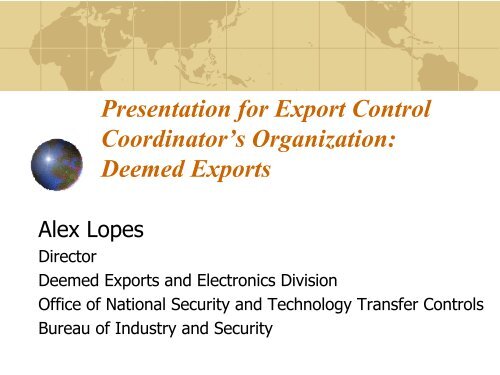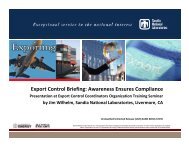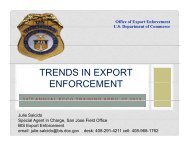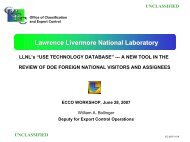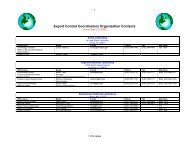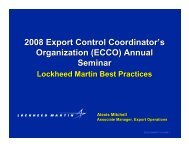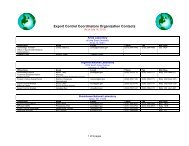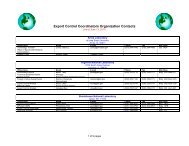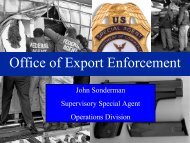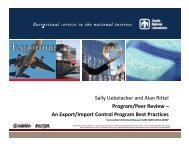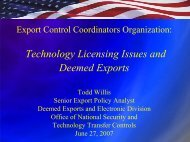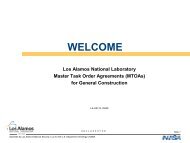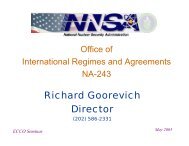Deemed Exports
Deemed Exports
Deemed Exports
Create successful ePaper yourself
Turn your PDF publications into a flip-book with our unique Google optimized e-Paper software.
Presentation for Export Control<br />
Coordinator’s Organization:<br />
<strong>Deemed</strong> <strong>Exports</strong><br />
Alex Lopes<br />
Director<br />
<strong>Deemed</strong> <strong>Exports</strong> and Electronics Division<br />
Office of National Security and Technology Transfer Controls<br />
Bureau of Industry and Security
The <strong>Deemed</strong> Export Issue<br />
• Foreign nationals in your work place<br />
– <strong>Deemed</strong> export rule applies to government<br />
agencies (and contractors)<br />
– Research with access to sensitive equipment<br />
• Release of data to a foreign national is the<br />
same as to their country of citizenship<br />
• Requirement for license is driven by<br />
commodity classification of data, access<br />
required to that technology, and the foreign<br />
national’s country of origin<br />
• DOE/IG-0645 of April 2004
What is a <strong>Deemed</strong> Export?<br />
Release in the United States of technology or<br />
source code subject to the Export Administration<br />
Regulations to a foreign national.<br />
Such release is “deemed” to be an export to the<br />
home country or countries of the foreign national.<br />
See Section 734.2(b)(2)(ii) of the EAR.
Exempted from the Rule<br />
Any foreign national is subject to the deemed<br />
export rule except:<br />
A foreign national granted U.S. citizenship;<br />
A foreign national granted permanent<br />
residence status (i.e., “Green Card” holders);<br />
A foreign national granted status as a<br />
“protected individual” under 8 U.S.C.<br />
1324b(a)(3). Protected individuals include<br />
political refugees and political asylum<br />
holders.
Examples of <strong>Deemed</strong> Export Releases<br />
• Visit of foreign delegations for company internal<br />
technical conferences.<br />
• Visual inspection (as reading technical<br />
specifications, plans, blueprints, etc.) by foreign<br />
nationals.<br />
• Providing technical assistance (including verbal<br />
exchanges) to foreign nationals.
<strong>Deemed</strong> Export ECCNs<br />
5A101<br />
Telemetry Equipment<br />
The deemed<br />
export rule<br />
primarily<br />
affects<br />
technology<br />
and software.<br />
5D101<br />
Telemetry Software<br />
5E101<br />
Telemetry Technology
Is a License Required?<br />
Step 1:<br />
Determine the technologies to be released. It is<br />
critical to classify the technology.<br />
Is the technology described in an entry on the<br />
Commerce Control List?<br />
If so, does a License Exception apply?<br />
Is the technology EAR99?<br />
Is the technology publicly available?
Step 1 (continued)<br />
Publicly Available Information<br />
Technologies which are "publicly available” do not<br />
require a license. These include:<br />
• Patent applications;<br />
• Publicly available technology and software<br />
(other than software and technology<br />
controlled as encryption items) that are<br />
already published or will be published;<br />
• Technology which arises during or as a result<br />
of fundamental research; or<br />
• Technology which is educational.
Fundamental Research<br />
• Fundamental research is basic and applied research in<br />
science and engineering where the resulting information is<br />
ordinarily published and shared broadly within the scientific<br />
community.<br />
• There may be deemed export license implications if the<br />
technology required to conduct the research is controlled by<br />
the EAR (e.g., use of equipment)<br />
• Fundamental research needs to be distinguished from the<br />
release of controlled “use,” “production,” or “development”<br />
technology that may need a deemed export license if required<br />
for a foreign national to conduct research
Licenses for Government Agencies<br />
• Release of controlled technologies by U.S.<br />
Government agencies and affiliates are treated in<br />
the same way as release of controlled technologies<br />
by private entities.<br />
• National Security Classification and export controls<br />
are separate concepts.<br />
• Federal fundamental research and private research<br />
receive identical licensing review.<br />
• There is no blanket deemed export licensing<br />
exemption for government agencies
Example:<br />
Conferences<br />
The release of information at<br />
an open conference is not<br />
subject to the EAR.<br />
A conference is “open” if<br />
all technically qualified<br />
members of the public<br />
are eligible to attend<br />
and attendees are<br />
permitted to take notes.<br />
Technologies discussed in open seminars and<br />
conferences are considered to be publicly available<br />
and are outside the scope of the EAR.
Is a License Required?<br />
Step 2:<br />
• Determine the home country of the foreign<br />
national.<br />
• Technology and home country of the<br />
foreign national determine licensing<br />
requirements.
Step 2 (continued<br />
Home Country<br />
(Dual Citizenship)<br />
As a general principle, a<br />
foreign national’s most<br />
recently obtained citizenship<br />
governs the licensing<br />
requirement.<br />
If an Indian foreign national<br />
becomes a citizen of the U.K.<br />
but retains Indian citizenship, the<br />
most recent citizenship is with<br />
the U.K. and releases of<br />
technology would be viewed as<br />
releases to the U.K.
Step 2 (continued)<br />
Home Country<br />
(Permanent Residency)<br />
Release of controlled technology to a foreign<br />
national of one country, say India, who has<br />
obtained permanent residency in another, say<br />
the U.K., is treated as if the shipment were<br />
being made to the U.K. and licensing<br />
requirements would be the same as for a<br />
British national in the U.K. *<br />
If the former Indian national becomes a<br />
British citizen, transfers of technology<br />
would be viewed as transfers to the U.K.<br />
* This policy is currently under review.
Remember<br />
Although the deemed export rule may apply, this<br />
does not automatically mean that a license is<br />
required.<br />
The technology to be released to the foreign national<br />
may be:<br />
Publicly Available;<br />
EAR99;<br />
License Exception eligible (e.g., TSU, TSR, ENC)
Parties of Concern:<br />
Denied Persons List<br />
Entity List<br />
Specially Designated Nationals and Blocked Persons
Listed Entity Involvement<br />
Release of controlled technology to an employee of a<br />
listed entity is treated as a release of controlled<br />
technology to the listed entity itself.
Review and Escalation Process<br />
Company Screening Process<br />
Confidentiality Review<br />
& Agreement<br />
BIS<br />
<strong>Deemed</strong> Export Division<br />
INS Work Visa<br />
BIS<br />
OEE<br />
DOD<br />
DOE<br />
(For NP Only)<br />
FBI<br />
STATE<br />
Operating<br />
Committee e (OC)<br />
(If Necessary)<br />
essa Advisory Committee<br />
on Export Policy<br />
(ACEP)<br />
(If Necessary)<br />
essa Export Administration<br />
Review Board (EARB)<br />
(If Necessary) essa
<strong>Deemed</strong> Export Evaluation Factors<br />
• Personal background, including visa status<br />
• Technology and purpose of the release<br />
• Applicant’s Technology Control Program<br />
• Projected outcome of employment<br />
• Permanent employee
Required Information:<br />
Letter of Explanation<br />
• Identities of all parties to the transaction<br />
• Exact project location (where the technology or<br />
software will be used)<br />
• Type of technology<br />
• Form in which the technology will be released and<br />
the uses for which the technology will be employed.<br />
• Technical scope<br />
• Availability abroad of comparable foreign technology<br />
or software<br />
• Applicant’s technology control plan
Essential Elements of a Technology<br />
Control Plan<br />
• Corporate commitment to export<br />
compliance<br />
• Physical security plan<br />
• Information security plan<br />
• Personnel screening procedures<br />
• Training and awareness program<br />
• Self evaluation program
Required Information:<br />
Foreign National’s Résumé<br />
• All educational institutions attended beyond high<br />
school, with street addresses and degrees and/or<br />
certificates received<br />
• All positions held, with employers’ names and street<br />
addresses, and brief description of work done<br />
• All time from high school graduation should be<br />
accounted for and presented in month/year format,<br />
with no gaps greater than 30 consecutive days<br />
• Brief abstracts of all scientific and technical papers<br />
published, and presentations at scientific and technical<br />
conferences
Helpful Information<br />
• Applications are easier to approve if they include<br />
details such as:<br />
• Any strong ties to the U.S. (e.g., family here)<br />
• No ties to home country (no bank account,<br />
immediate family, etc.)<br />
• Any special benefits or expertise the foreign<br />
national brings to the applicant (i.e., why the<br />
foreign national brings more to the company than<br />
he or she will take away)
Most Commonly Licensed Technologies for<br />
<strong>Deemed</strong> <strong>Exports</strong><br />
Semiconductor & Electronics<br />
Telecommunications<br />
Computer Systems<br />
Top deemed exports ECCNs include:<br />
4E001, 3E001, 5E001, 4D003, and 3E002
<strong>Deemed</strong> <strong>Exports</strong> Licensing Data<br />
Number of cases closed<br />
1000<br />
900<br />
800<br />
700<br />
600<br />
500<br />
400<br />
300<br />
200<br />
100<br />
0<br />
706<br />
592<br />
846<br />
777<br />
TOTAL<br />
APPROVED<br />
REJECTED<br />
RWA'd<br />
952<br />
798<br />
110<br />
150<br />
4<br />
60<br />
9 4<br />
FY 02 FY 03 FY 04*<br />
* Projected based<br />
on mid-yr stats<br />
Days<br />
100<br />
90<br />
80<br />
70<br />
60<br />
50<br />
40<br />
30<br />
20<br />
10<br />
0<br />
87<br />
FY 02 FY 03 FY 04*<br />
62<br />
53<br />
* Projected based<br />
on mid-yr stats
<strong>Deemed</strong> Export Initiatives<br />
• Recently Implemented Process Improvements<br />
– Automatic six month extensions for existing<br />
licenses being renewed<br />
– Tying license validity to visa expiration<br />
– Interagency best effort to review license upgrades<br />
in 20 days<br />
• Special Intra-company License<br />
• Proposed rule changes for microprocessor<br />
and high performance computer technology
Bureau of Industry and Security<br />
<strong>Deemed</strong> <strong>Exports</strong> and Electronics Division<br />
Contact Information<br />
Alex Lopes<br />
Bob Juste<br />
Director<br />
Senior Engineer/Licensing Officer<br />
Phone: 202-482-4875 Phone: 202-482-2845<br />
E-mail: alopes@bis.doc.gov E-mail: rjuste@bis.doc.gov<br />
Kurt Franz<br />
Todd E. Willis<br />
Policy Analyst/Licensing Officer Policy Analyst/Licensing Officer<br />
Phone: 202-482-2278 Phone: 202-482-9163<br />
E-mail: kfranz@bis.doc.gov<br />
E-mail: twillis@bis.doc.gov<br />
Dana Perkins, Ph.D. Office Fax: 202-482-1373<br />
Microbiologist/Licensing Officer<br />
Phone: 202-482-4201<br />
E-mail: dperkins@bis.doc.gov<br />
DOC Bureau of Industry and Security Website: www.bis.doc.gov


